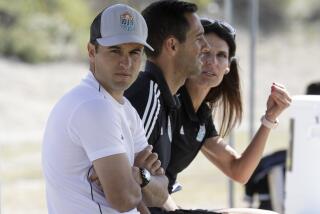Investigated by Senate, FBI, Special Prosecutor : Allegations Dogged Donovan in Office
- Share via
NEW YORK — Almost from the day President Reagan nominated Raymond J. Donovan to be his secretary of labor in December, 1980, the plain-speaking New Jersey construction executive has fought allegations of corruption, ties to organized crime and other legal problems.
From the start, Donovan insisted he was innocent of any wrongdoing and vowed to keep his job and clear his name. He survived a lengthy Senate investigation, repeated FBI probes and two investigations by a special federal prosecutor.
But Friday, Donovan lost to a Bronx prosecutor. The 54-year-old self-made millionaire resigned his Cabinet post after a New York judge refused to dismiss a 137-count indictment for grand larceny and fraud and cleared the way for a criminal trial.
One of 12 children, Donovan grew up in blue-collar Bayonne, N.J., in a home he described as “intensely Democratic and intensely Roman Catholic.” He helped raise his siblings when his parents died and studied philosophy at seminaries in Alabama and New Orleans.
Invested Savings
But in 1952, Donovan entered business instead of the priesthood. Seven years later, he contributed his entire savings of $5,600 to become a partner in the tiny Schiavone Construction Co. in nearby Secaucus.
In the next two decades, the growing company won more than $1 billion in contracts to build bridges, roads, tunnels, sewage treatment plants and other construction projects, mostly in New York, New Jersey and Pennsylvania. Donovan became executive vice president and owned 40% of the stock.
Reagan appointed Donovan after he used his New Jersey construction ties to raise more than $600,000 for Reagan’s 1980 campaign.
But Donovan’s role in the construction company haunted him when he arrived in Washington. His Senate confirmation hearings were delayed while the FBI investigated 18 allegations that Donovan and the Schiavone company were involved in bid rigging, labor payoffs and organized-crime murders.
Allegations Unconfirmed
The FBI could not confirm any of the allegations, and Donovan was finally confirmed Feb. 17, 1981. The vote was 80 to 17.
At the time, Donovan blamed what he called the “New Jersey syndrome” for his legal troubles. “If you are in the contracting business in New Jersey, you’re indicted,” he said. “If you are in the contracting business in New Jersey and Italian, you’re convicted.”
But later that year, a group of senators complained of inadequacies with the FBI probe and demanded the case be reopened. A panel of federal judges named a federal special prosecutor in the case in December, 1981, under provisions of the Ethics in Government Act.
For six months, special prosecutor Leon Silverman and a special grand jury interviewed dozens of witnesses and examined 14 allegations that Donovan was tied to organized crime figures. He found Donovan’s name was mentioned 10 times on FBI wiretap tapes made during organized crime investigations in the Bronx and Florida.
Insufficient Evidence
But in June, 1982, Silverman concluded that he found “insufficient credible evidence” to justify charges that Donovan had ties to organized crime. Three months later, Silverman cleared Donovan of 14 other allegations, again claiming insufficient evidence.
Then last summer, a state grand jury in the Bronx began looking at Donovan while investigating the September, 1978, gangland slaying of convicted racketeer Salvatore Frascone.
Prosecutors said the murder resulted from a dispute among mobsters over the control of a Bronx company called Jopel Contracting & Trucking Corp. The dispute broke out while Jopel was a subcontractor to the Schiavone company on a $186-million subway construction project in Manhattan.
Donovan was formally indicted with nine other men and the two companies last Sept. 25. On Oct. 1 he took an unpaid leave of absence to fight the charges. The next day he and his co-defendants pleaded innocent to charges that they had conspired to steal $7.4 million by using Jopel as a front to circumvent state and federal minority business requirements. Donovan was booked, fingerprinted and photographed like any criminal suspect.
More to Read
Sign up for Essential California
The most important California stories and recommendations in your inbox every morning.
You may occasionally receive promotional content from the Los Angeles Times.














